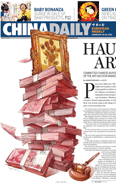Money
Chinese tourists named top shoppers
Updated: 2011-02-24 07:51
By Wang Zhuoqiong (China Daily)
BEIJING - It used to be the Russians who splurged on tax-free shopping for authentic and luxury brands while traveling to European countries.
Since last summer, not only have Chinese tourists emerged as the top tax-free shoppers in Europe, their average spending for each transaction doubled that of the Russians.
"On average, Chinese tourists spent 107 percent more year-on-year on tax-refunded shopping abroad in 2010, reaching a 130 percent spike in September compared with the same month in 2009," said Manelik Sfez, vice-president of global marketing at Switzerland-based Global Blue, a tax-refund and shopping services provider.
Excluding shopping, the average total cost for each trip for a Chinese tourist stands at 2,000 euros ($2,743). Shopping takes up more than 70 percent of total outbound consumption of Chinese travelers.
Chinese international shoppers account for 17 percent of Global Blue's tax-refund transactions, ahead of Russians with 15 percent.
On average, outbound travelers from the Chinese mainland spent 744 euros on tax-free shopping transactions last year, doubling the Russian's 368 euros. Tourists from the United States spent 554 euros and the Japanese 521 euros, according to Global Blue.
Sfez said the trend could evolve into a tax-free shopping market worth 5 billion euros by 2020 if confidence in the Chinese economy and the currency exchange rate maintain the same momentum.
China's outbound tourism has been booming thanks to the appreciation of the yuan and the increasing size of its economy. Tax-free shopping is one of the major incentives for Chinese travelers going abroad.
According to the China Tourism Academy, the number of Chinese outbound tourists is projected to have been 15.42 million in the third quarter of 2010, up 23.5 percent compared with the same period in 2009.
In addition to the 13 million tax-refund transactions handled annually, the company works with more than 270,000 retailers, brands and hotels in more than 40 countries and serves about 38,000 customers each day.
Being aware of the trend to prioritize Chinese customers by European merchants, Sfez said it is important for businesses to know that "Chinese people are not spending machines".
"They are people. They want information. You cannot schedule a Chinese tourist group like scheduling a train or a flight," he said. "This is just a different culture. It can be served just like any other: Europeans, Americans or Japanese."
To cater to the rising number of Chinese travelers, the company brought European merchants to China to meet with local tour operators and get to know the market. In March, Global Blue invited a group of major luxury-brand companies from Italy, France, and the United Kingdom to discover the reality and operation of Chinese market, Sfez said.
Chinese travelers spent the most on fashion, jewelry and watches, and they like to shop at big department stores where more options are available, according to Global Blue.
According to Sfez, many Chinese customers do not know the heritage and history of certain brands. "They prefer brands that are very traditional - brands that everybody knows and sell the most," he said.
But recently Global Blue has found that Chinese travelers can be highly interested in boutique stores, where the production of high-end luxury goods is limited.
"Once we took a very big group of Chinese tourists to Switzerland, where they visited watch manufacturer Jaeger LeCoultre. They were highly interested," Sfez said.
"If merchants want to have a better relationship with Chinese customers, they have to go beyond money. Money will come. But if you establish a solid foundation, it becomes more stable and easier."
It is not just the level of the brands that matters the most, but also the knowledge of the brands that matter to the consumers, he said.
"We have no opinions on the brands. We want to put all the information on the table and let the customers choose," he said.
With offices in China since 2005, the company has prioritized the country in the core strategy of its expansion plans in the Asia-Pacific region.
"We go where Chinese consumers go," he said. "One of the prime factors in providing tax-refund services in Japan is because the Chinese go there to shop."
China Daily
(China Daily 02/24/2011 page16)
E-paper

Online shops boom in China
Low investment, quick returns offer profit-making opportunities for struggling students.
Something 'fishy' about this trick
Banking on success
Branded outlets move in
Specials

The green lantern
Environmental concerns are shedding new light on a colorful tradition

Inland interchange
Chongqing bets on its position as a hub for China's west.

Zooming in on Chinese skies
Helicopter companies ride on country's growing interest in luxury aviation.
